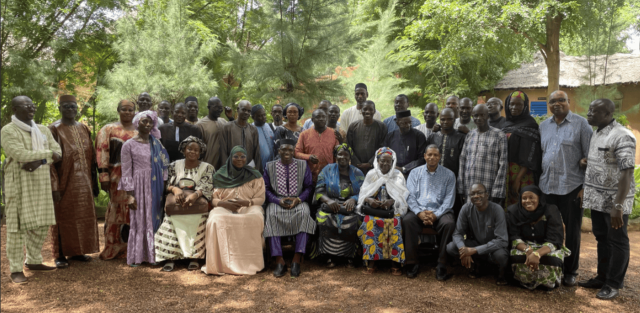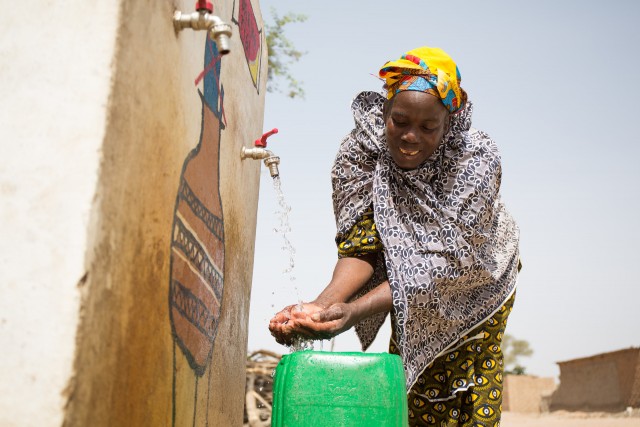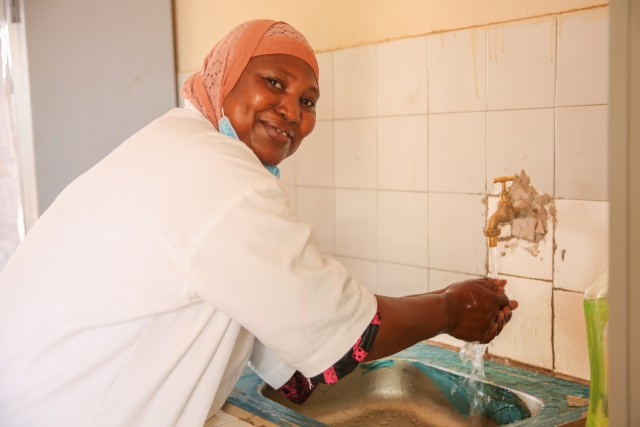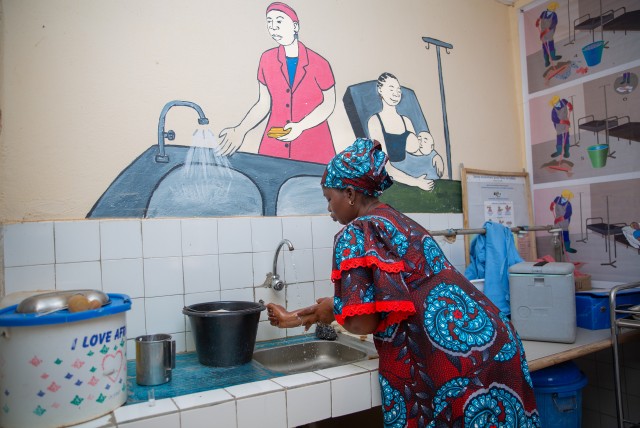Beseya Blon: A Commitment to Health, Hygiene, and Collective Strength

Bolo Kele tesseka bele ta — One finger cannot lift a pebble.
Hygiene is a shared responsibility—one that requires both individual commitment and collective action. Yet, across the globe, it is often inadequate where it is most crucial.
Almost one in ten health care facilities worldwide lack basic hygiene services, leaving some 722 million people behind.1 In rural Mali, where only 30% of health care facilities have handwashing stations and toilets stocked with soap and water,2 the absence of these essential services increases the risk of infections, endangers maternal and newborn health, and compromises efforts to prevent disease outbreaks.
For nearly a decade, One Drop and WaterAid have worked with local partners to enhance access to sustainable water, sanitation, and hygiene (WASH) services in the Kati and Bla districts of Mali. Between 2016 and 2019, the Ji Ni Beseya project improved access to sustainable WASH services for more than 82,000 people. The following year, the Beseya Blon project was launched, with a renewed focus on enhancing coordination, maximizing efficiency, and cultivating community engagement.

Ji Ni Beseya project, 2018. Credit: WaterAid/Basile Ouedraogo
Now that the Beseya Blon project has come to an end, we reflect on its achievements and the lasting changes it has sparked within communities.
Measuring Impact: How We Transform Health and Hygiene
Launched in a period of unprecedented climate impacts, socio-political shifts, and a global pandemic, Beseya Blon had to adapt swiftly to new challenges to achieve lasting outcomes. Operating across 12 rural communes, the initiative worked in both community and health care settings, improving infrastructure and mobilizing community members through innovative social art activities.
The project made significant strides in improving WASH facilities within health care settings and communities:
For Aminata, nurse and technical director of the community health centre in Touna, the improvements to her workplace mean she can now carry out medical checks day and night. “With all these achievements, the population is safe and sound thanks to access to WASH services. Whether visitors, workers or patients, we are all protected.”

Aminata washing her hands at the sink installed in her office, at the health centre of Touna. Credit: WaterAid/Basile Ouedraogo
Leveraging Social Art for Lasting Behaviour Change
A cornerstone of the Beseya Blon project was how it harnessed One Drop's signature Social Art for Behaviour Change™ (SABC) approach to engage communities through creative, participatory, and culturally relevant artistic expressions. Key activities included:
Training and mobilization: 24 Leaders of Change from 12 communes and 16 health care centres were trained in artistic techniques that equipped them to drive local engagement and advocacy.
Artistic murals and visual communication: Medical staff from 16 health care centres co-created murals promoting handwashing and hygiene, reinforcing key messages in a highly visible and engaging way.
Theatre and community dialogue: Interactive performances and storytelling were used to spark discussions and commitments around hygiene and sanitation practices. Community-led activities such as community meetings and dialogue sessions ensured that hygiene behaviours were adopted and maintained over time.
In total, 331 social art activities were rolled out—surpassing the original target of 80— engaging health care workers, patients, artists, women's groups, community leaders, and various other community members. Overall, social art transformed traditional awareness campaigns into immersive and participatory experiences, making hygiene and sanitation improvements more relatable, memorable, and sustainable for the people living there.

Sanata washing her hands inside the delivery room, at the community health centre of Touna. Credit: WaterAid/ Basile Ouedraogo.
By dovetailing infrastructure improvements, behaviour change initiatives, and community engagement, Beseya Blon significantly exceeded its original targets:
Community Leadership, Governance, and Women's Empowerment: A Foundation for Sustainability
Beseya Blon prioritized strengthening local governance and encouraging accountability, ensuring that communities had the knowledge and agency to sustain WASH improvements for the long term. Through the establishment of village water and sanitation committees, local leaders were equipped with the tools to advocate for their rights and ensure ongoing WASH improvements. Training programs strengthened the capacity of nine civil society organizations and three media outlets, amplifying the project’s impact and empowering long-term community ownership.
Recognizing the crucial role of women in water and sanitation management, Beseya Blon implemented targeted gender and social inclusion strategies. Sixteen women’s cooperatives were established—well beyond the initial goal of five—providing financial literacy and entrepreneurship training to a total of 11,620 women. These cooperatives have since launched income-generating activities, with 5% of their earnings reinvested into hygiene promotion at community health centres, ensuring ongoing community mobilization and the sustainability of services.
Building on Beseya Blon’s Legacy
In Bambara, beseya blon means “the hallway where one can discuss and reach the highest levels of hygiene.” True to its name, the project has fostered open dialogue, collective action, and community-driven solutions to improve hygiene and public health. Though Beseya Blon has officially concluded, the structures, knowledge, and community-driven initiatives it helped grow remain active, ensuring a lasting impact on health and hygiene in Mali and across the Sahel.
As the region faces growing challenges from climate change, water scarcity, and instability, access to essential WASH services is increasingly at risk. Through the SCOFI project in Mali and the ESEPV project in Burkina Faso, One Drop and its partners continue to strengthen community resilience and co-develop sustainable solutions, securing lasting WASH improvements where they are needed most.
We call on partners, donors, and advocates to join us in empowering communities in the Sahel with the resources and knowledge they need to secure a healthier future.
Let’s shape a water-secure future, together. Get involved.
1 WHO and UNICEF. Joint Monitoring Programme (JMP). Progress on WASH in health care facilities 2023 data update
2 WHO and UNICEF. Joint Monitoring Programme (JMP). Progress on WASH in health care facilities 2000-2021
